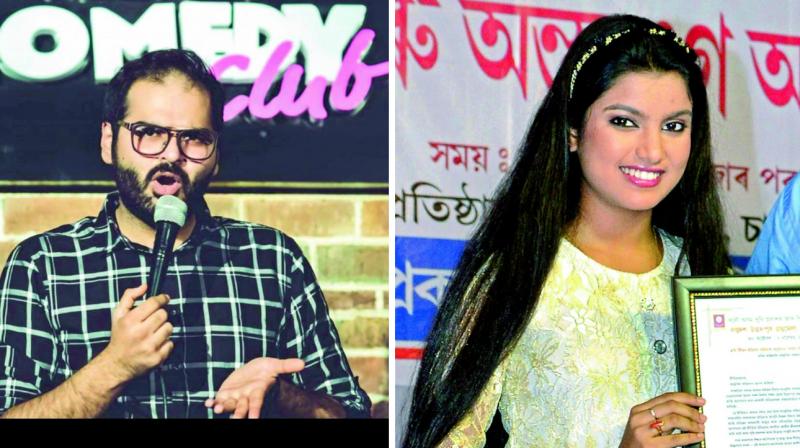Grapes of wrath

It is unfortunate that in a democracy like ours, where one has the right to freedom of expression, a few groups remind us how India is not a country for artistes.
Take for instance the case of teenage singer Nahid Afrin, against whom pamphlets were issued by clerics in Assam, since her performance was to take place in the vicinity of a mosque and a graveyard.
The leaflet reportedly read, “If anti-Sharia acts like musical nights are held on grounds surrounded by masjids, idgahs, madrassas and graveyards, our future generations will attract the wrath of Allah.” A Muslim woman, Suhana Sayeed, from Karnataka was also trolled on Facebook for singing a Hindu devotional song and for singing in front of men.
Another instance is that of comedian Kunal Kamra, who received death threats after he posted a video on patriotism and governance, making relevant points about demonetisation and its link with patriotism.
While posting the video, Kunal wrote, “Loving your country means asking a lot of questions: Asking for peace, asking for better living conditions, asking for your right to voice your opinion if the taxes you’re paying are not leading to the life you ideally want to live.”
Filmmaker Sanjay Leela Bhansali also had to face this, as certain groups feel that there is a sequence in the movie, which has an intimate scene between Alauddin Khilji and Rani Padmavati.
Though Bansali has said that no such scene exists in the movie, this has not stopped the attacks. The director was attacked on the sets a couple of weeks ago, and recently, a set constructed in Kolhapur was set on fire.
Commenting on the issue, A.R Rahman’s sister, A.R. Reihana, who is also a singer and composer, says, “My brother A.R. Rahman also received a fatwa, but those who issued it never even saw the film, Muhammad: The Messenger of God! Later, they would have repented it for sure. Religious groups should be careful in objecting to a film or song. If they have a strong reason backing them, then the artistes would listen. In Rahman’s case, they had no solid reason. Also, freedom of expression should be shown in one’s music. A person should voice their opinion in the right manner. Lyrics shouldn’t offend anybody and musicians have the responsibility to act accordingly.”
Stand-up comedian Aditi Mittal thinks the problem is that our youth are not concentrating on their own jobs and education. “By 2020, we will be the youngest country in the world; we will have a young group of people with passion. Such incidents are an indication that our education and jobs are not occupying them. My mum told me the other day, that back in their day, only if they felt strongly against something, would they protest on the streets. She said that our generation is on the Internet a lot, and we all know how easily they can be exploited,” says Aditi, continuing, “The instances were not intentionally hurtful. The fact that it becomes an issue, and someone has the time to find out Kunal’s address, create a group and send him threatening messages shows that the person has nothing else to do. It shows that our youth can be exploited for political reasons and they have the time, energy and enthusiasm to do it too. What kind of people are we becoming?”
Comedian Sorabh Pant says that not mentioning the names of these extremist groups may help discourage them. “Regarding Sanjay Leela Bhansali, you have the Rajasthan’s Social Justice and Empowerment Minister Arun Chaturvedi himself saying that the movie will be released in the state only after it is screened in front of the group that attacked him. That particular Sena has seven lakh soldiers. SLB is one guy and Bollywood refuses to stand up in unity. It implies that they will continue to get bullied until they decide to do something as a unit,” he says.
Sorabh adds, “I genuinely believe that there are a lot of sensible people but they refuse to stand up. For every 60 people who vandalise, 60,000 disagree with it. But those 60 are really loud and the rest refuse to speak.”
— With inputs from Janani K

